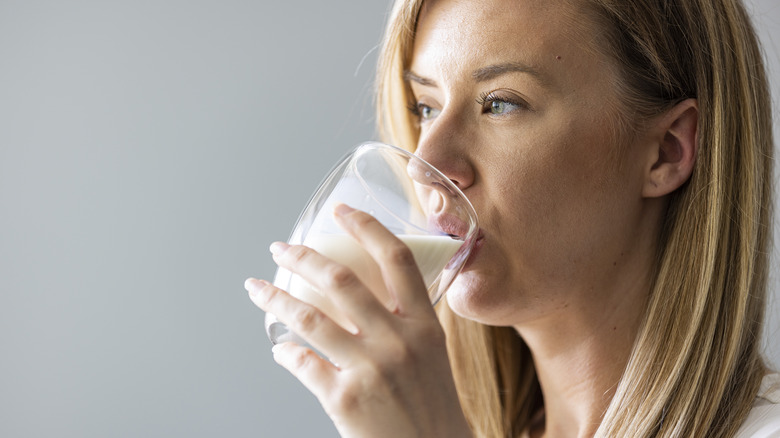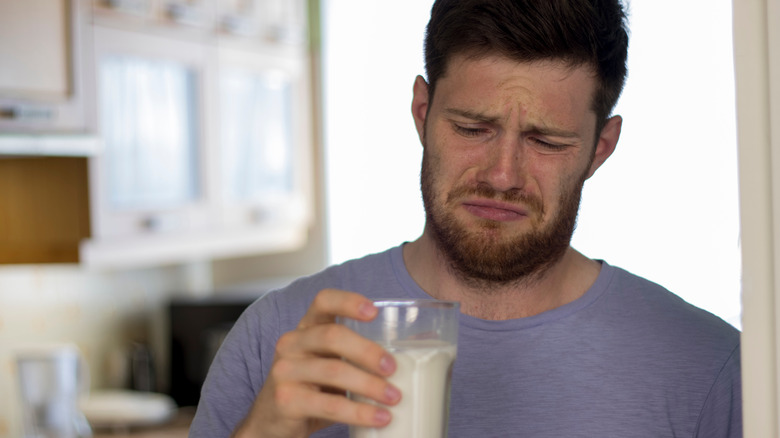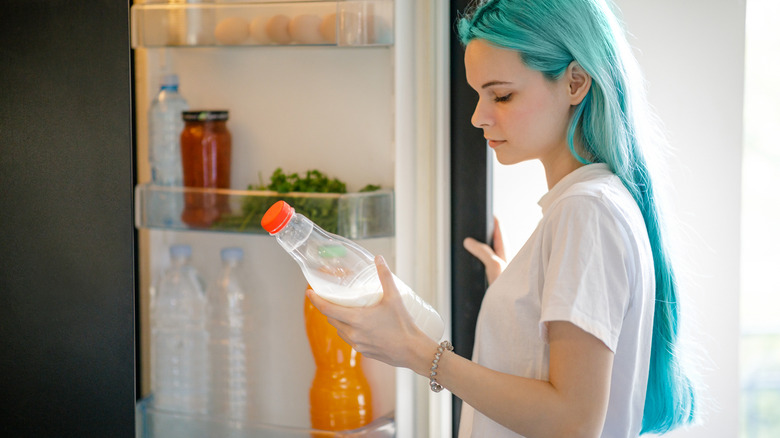Here's What Happens When You Take A Sip Of Spoiled Milk
Milk is something most of us have in our homes. After all, you drink milk every day with your coffee or add some to your morning cereal. In addition to being a type of food that complements beverages, baking, and other dishes, milk is rich in calcium, phosphorus, B vitamins, potassium, and vitamin D. But try as you might to keep track of expiry dates, you sometimes find yourself with more than one carton of milk in your refrigerator. And it is at times like these when you might accidentally pour some spoiled milk in with your cereal.
What exactly happens, though, if you take a sip of spoiled milk? Nothing much, say the experts. Usually, the rancid smell and sour taste should put you off from drinking more. It's also pretty obvious when milk has gone bad. The signs include an unpleasant odor, sour or acidic flavor, and even a slightly yellowish tint and chunky texture (via Healthline). But, a sip is not the same as tipping back the carton and drinking a lot more.
Here's what happens if you take more than a sip of spoiled milk
New York-based internist and gastroenterologist Dr. Niket Sonpal told Well+Good, "Typically, if you ingest enough spoiled milk, it can take a toll on your gastrointestinal tract." We're talking stomach cramps, vomiting, and diarrhea. The effects of ingesting more than a sip of spoiled milk are similar to the effects of consuming other foods that carry food-borne illnesses, per Missouri Poison Center. Most of the time, the after-effects of eating or drinking something spoiled should resolve on their own, though you might have to wait 12 to 24 hours.
The first thing you should do if you think you have food poisoning is to replenish lost fluids from all the vomiting and diarrhea. Aim to hydrate with beverages that have sugar and electrolytes, per Missouri Poison Center. Avoid taking any medications without a doctor's approval. If your symptoms don't improve within 24 hours, if you're severely dehydrated and vomiting everything you take in, if you have a fever, and if your diarrhea continues for more than three days, it's time to visit your healthcare provider, noted the Centers for Disease Control and Prevention. It might be wise to prevent this from happening by storing your milk the proper way and also by understanding how milk spoils in the first place.
How to store your milk properly
Contrary to what you might believe, storing milk on the door of your refrigerator is a bad idea. The door is actually one of the warmest spots in your refrigerator, mainly because every time you open the door, you're exposing the produce there to fluctuating temperatures. Along with things like meat, cheese, fruits and vegetables, and eggs, milk is one other household purchase that should not be stored in the refrigerator door. "Milk should be stored on a shelf toward the back of the fridge where it is coldest," explained Charleston, South Carolina-based chef Molly Gordon (via Southern Living).
All milk spoils; whether it's pasteurized or plant-based milk does not matter. How does milk spoil? An overgrowth of bacteria is what causes milk to spoil. Registered dietitian Jenna Volpe told Livestrong, "Milk spoils because of an overgrowth of microbes over time. The microbes start to ferment particles in the milk, which allows them to multiply and compromises the quality and taste." Exposing milk to warm temperatures and light can accelerate spoilage, per Healthline. So the next time you want to drink milk before bed, quickly give the carton a sniff test. Your nose might be your best first line of defense that stops you from moving from a sip of spoiled milk to a gulp.



